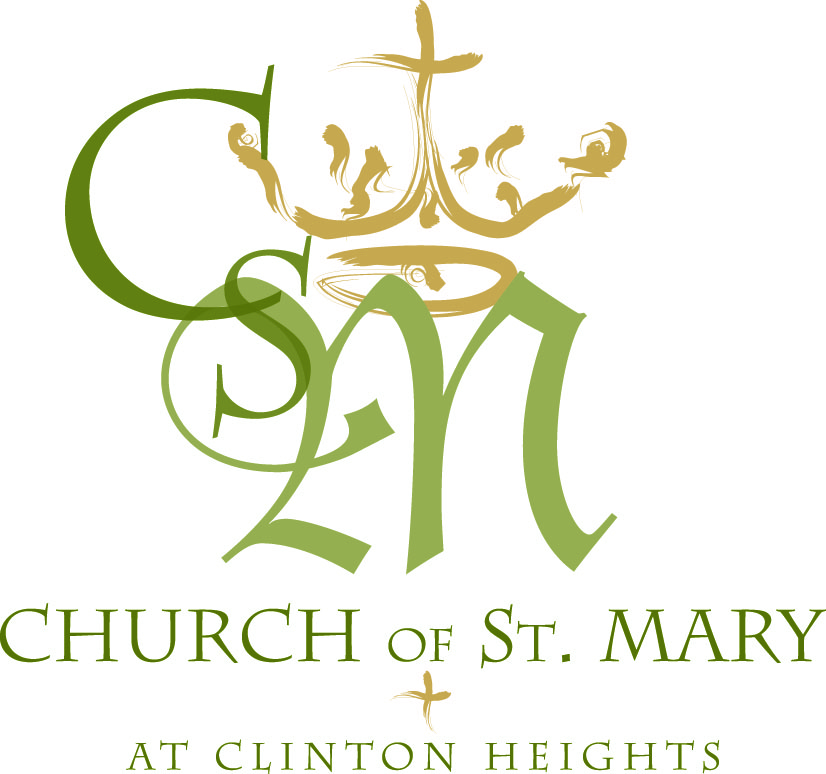Parishes’ Pastoral Council
In the Fall of 2016, the Parish Pastoral Councils of both St. John the Evangelist & St. Joseph of Rensselaer and the Church of St. Mary at Clinton Heights began the process of establishing a new, singular “Parishes’ Pastoral Council” to serve our parishes as a wider community. This is a natural progression as our parishes have worked most closely together over these last two years. On September 27, 2016, the following Preamble and Statutes were adopted:
Preamble
Section 1 – Jesus Calls All to be His Disciples through Baptism
The Lord Jesus, after His saving and glorious Resurrection, and immediately prior to His Ascension to the Father, approaches the disciples and says to them, “All authority in heaven and on earth has been given to me. Go therefore and make disciples of all nations, baptizing them in the name of the Father and of the Son and of the Holy Spirit” (Matthew 28:18b-19). From this foundational moment, Christ demonstrates His desire for all to be one in Him, through the power of the Holy Spirit, such power which is truly life-giving. “All Christians consecrated by the Holy Spirit through the sacrament of Christian initiation ‘into a spiritual house and a holy priesthood’ are called by Christ the Lord himself to cooperate actively in the saving mission of all the priestly people of God.”[1] This cooperation is open to all[2], and it forms an ecclesial communionand communitywhich is the Church, the Body of Christ.
Section 2 – The Church: The People of God
The community of the Church, while entrusted to the care of the hierarchy and its ministers, is not solely and completely given to one or another of its members. In particular, “the priest is exhorted ‘…to grow in awareness of the deep communion uniting him to the People of God’ in order to ‘awaken and deepen co-responsibility in the one common mission of salvation, with a prompt and heartfelt esteem for all the charisms and tasks which the Spirit gives believers for the building up of the Church’.”[3] Thus, each and every member of the community is invited to be a conscious, active participant in this one community of faith in Christ. “Ecclesial communion implies that each local church should become what the synod fathers called a ‘participatory church,’ a church, that is, in which all live their proper vocation and perform their proper role. In order to build up the ‘communion for mission’ and the ‘mission of communion,’ every member’s unique charism needs to be acknowledged, developed and effectively utilized. In particular, there is a need to foster greater involvement of the laity and consecrated men and women in pastoral planning and decision making through such participatory structures as pastoral councils and parish assemblies.”[4]
Section 3 – The Sharing of Gifts
Yes, even in the areas of leadership and governance, all the faithful have gifts that can benefit the apostolic works of the entire community. “The salvific mission of the entire People of God in which all the faithful, according to each one’s status within the Church, have their own proper part and responsibility, cannot be restricted to one mission of the holy pastors or Church hierarchy: ‘For the pastors know that they themselves were not meant by Christ to shoulder alone the entire saving mission of the Church toward the world but, on the contrary, they understand that it is their noble duty so to shepherd the faithful and recognize their service and charismatic gifts that all, according to their proper roles, may cooperate in this common undertaking with one heart’.”[5] The faithful, in accepting nascent gifts from the Lord, are well-disposed then, to the honing and developing of those gifts, that they may bear much fruit. Thus, “by reason of the knowledge, competence or pre-eminence which they have, the laity are empoweredindeed sometimes obligedto manifest their opinion on those things which pertain to the good of the Church.”[6]
Section 4 – Advice & Counsel in the Life of the Parish
And how do the laity find themselves existing and thriving within the Church of God? “The ecclesial community, while always having a universal dimension, finds its most immediate and visible expression in the parish. It is there that the Church is seen locally. In a certain sense it is the Church living in the midst of the homes of her sons and daughters.[7]“[8] And so the universal is also present in the local…the parish. “It is necessary that in light of the faith all rediscover the true meaning of the parish, that is, the place where the very “mystery” of the Church is present and at work, even if at times it is lacking persons and means, even if at other times it might be scattered over vast territories or almost not to be found in crowded and chaotic modern sections of cities. The parish is not principally a structure, a territory, or a building, but rather, “the family of God, a fellowship afire with a unifying spirit”[9], “a familial and welcoming home”[10], the “community of the faithful”[11]. Plainly and simply, the parish is founded on a theological reality, because it is a Eucharistic community[12]. This means that the parish is a community properly suited for celebrating the Eucharist, the living source for its upbuilding and the sacramental bond of its being in full communion with the whole Church. Such suitableness is rooted in the fact that the parish is a community of faith and an organic community, that is, constituted by the ordained ministers and other Christians, in which the pastorwho represents the diocesan bishop[13]is the hierarchical bond with the entire particular Church.”[14]
And from that family of believers, who constitute the living Body of Christ in our midst, comes a collaboration which is transparent, imbued with trust and mutual respectwhich seeks to form the Church. “It is in the parish that most Catholics learn that they have been constituted as church (or a portion of the church) and that, at the same time, they experience how to form the church. The collaboration of clergy and men and women religious as well as laity is needed to achieve this. This collaboration requires the consultation of the laity to determine the pastoral needs and aspirations of the community. A more fitting way to reach this goal is the establishment of a pastoral council in which all can take part, whatever their age or condition.”[15]
Section 5 – Advice & Consultation: Arranged and Ordered as a Parish Pastoral Council.
From the Second Vatican Council came a strong desire to use general discussion aimed at consensus when examining and resolving pastoral challenges. From the World Synod of Bishops in 1987, came a very extensive and decided appreciation for ‘parish pastoral councils’ to be one of the significant ways to advise and consult pastors. “The work of the pastoral council is to examine and consider all that relates to pastoral work and to offer practical conclusions on these matters, so that the life and activity of the People of God may be brought into greater conformity with the Gospel.”[16] Although such councils can provide for great input and review, they still remain consultative bodies to pastors, without deliberation.
Section 6 – An Inter-Parochial Council
As parishes in communion, and with close geographical and familial ties, it is providential that the universal Church has envisioned and welcomed close collaboration between parishes, especially in ministry and mission: “For the renewal of parishes and for a better assurance of their effectiveness in work, various forms of cooperation even on the institutional level ought to be fostered among diverse parishes in the same area.”[17] To that end, constant, must be our aim to ensure that a singular Pastoral Council for our parishes is established and remains, well-functioning, in its purpose and exercise.[18]
[1] Sacred Congregation for the Clergy, “Private Letter on ‘Pastoral Councils'” (Omnes Christifideles, 1/25/73), reprinted in James I. O’Connor, editor, The Canon Law Digest. Vol. VII: Officially Published Documents Affecting the Code of Canon Law 1968-1972 (Chicago: Chicago Province of the Society of Jesus, 1975), pp. 280-288; no. 1.
[2] Can. 208: “In virtue of their rebirth (Baptism) in Christ there exists among all the Christian faithful a true equality with regard to dignity and the activity whereby all cooperate in the building up of the Body of Christ in accord with each one’s own condition and function.”
[3] Instruction on Certain Questions Regarding the Collaboration of the Non-Ordained Faithful in the Sacred Ministry of Priest, issued by eight dicastries of the Roman Curia (Vatican City: Libreria Editrice Vaticana, 1997), par. 28.
[4] Apostolic Exhortation of Pope John Paul II presented in New Delhi, India, on November 6, 1999 to more than 100 Asian Bishops. It is based on the work of the April 19 – May 14,1998 Special Assembly for Asia of the Synod of Bishops, one of the regional synods called for by the pope as part of preparations for the Jubilee Year 2000. Published in Origins 29:23 (November 18, 1999): par. 25.
[5] Sacred Congregation for the Clergy, Omnes Christifideles, no. 2.
[6] Second Vatican Ecumenical Council, “Dogmatic Constitution on the Church,” Lumen Gentium, November 21, 1964, translated by Colman O’Neill, OP, in Austin P. Flannery, General Editor, The Documents of Vatican II. Preface by John Cardinal Wright (New York: Costello Publishing Company, 1975), no. 37.
[7] The Council documents read: “It is impossible for the bishop always and everywhere to preside over the whole flock in his Church, he must of necessity establish groupings of the faithful. Among these, parishes set up locally under a pastor who takes the place of the bishop are the most important: for in a certain way they represent the visible Church as it is established throughout the world” (Second Vatican Ecumenical Council, The Constitution on the Sacred Liturgy Sacrosanctum Concilium, no. 42).
[8] John Paul II, “Christifideles Laici: Apostolic Exhortation on the Laity,” based on the 1987 World Synod of Bishops, January 30, 1987, Origins 18:35 (Feb. 9, 1989): no. 26.
[9] Second Vatican Ecumenical Council, Lumen Gentium, no. 28.
[10] John Paul II, Apostolic Exhortation Catechesi Tradendae, 67: AAS 71 (1979), 1333.
[11] Code of Canon Law. Latin-English Edition, 1983, Can. 515 § 1.
[12] Cf. Synod of Bishops (1987), “Synod 1987: The Synod Propositions.” Origins 17:29 (Dec. 31,1987): 502, proposition 10.
[13] Cf. Second Vatican Ecumenical Council, Sacrosanctum Concilium, no. 42.
[14] John Paul II, Christifideles Laici, no. 26.
[15] Synod of Bishops (1987), 502, proposition 10.
[16] Paul VI, Ecclesiae Sanctae I, August 6, 1966, “Apostolic Letter, written motu proprio, on the Implementation of the Decrees Christus Dominus, Presbyterorum Ordinis and Perfectae Caritatis,” translated from the Latin text in AAS 58 (1966) pp. 757-758 by Austin Flannery, in Austin P. Flannery, General Editor, The Documents of Vatican II. Preface by John Cardinal Wright (New York: Costello Publishing Company, 1975), no. 16§1.
[17] John Paul II, Christifideles Laici, no. 26.
[18] “Do such…Parish Councils, whether pastoral or financial, provide real opportunities for lay people to participate in pastoral consultation, organization and planning? The good functioning of these Councils is critical.” From Pope Francis’ address to the Leadership of the Episcopal Conferences of Latin America (CELAM) during the General Coordination Meeting, July 28, 2013, as reported by http://www.vatican.va/holy_father/francesco/speeches/2013/july/documents/papa-francesco_20130728_gmg-celam-rio_en.html
Statutes
ARTICLE I: NAME
The name of this body shall be “The Parishes’ Pastoral Council.” In its statutes, it is hereafter referred to as the “Council”.
ARTICLE II: PURPOSE
The purpose of this Council is to assist in the governance of the parishes according to the norm of the law and the directive of the parishes’ leaders[1], in order that the pastoral welfare of the people of God in the Church of St. Mary at Clinton Heights and St. John the Evangelist & St. Joseph in Rensselaer may be promoted as effectively as possible. To this end, all members of the Council are to strive to familiarize themselves with the values, various visionsas well as concernsof the entire community, and reflect these in the counsel provided to the leadership, for the good of the Church and the entire community.
The Council is to function as an advisory body for the leaders, who are thus informed by the wisdom, experience, discernment, and prudent judgment of the lay members. The Council is a consultative, non-deliberative body.
ARTICLE III: MEMBERSHIP
Section 1
The Council shall be composed of the leaders, no less than four (4) discerned members from the parishes (ideally, no less than two (2) discerned members from each parish), no less than one (1) appointed youth member under the age of seventeen (17) years from the community, and those corporate board members who serve ex-officio as Lay Trustees of each parish. In addition, the leaders may wish to appoint other members. Total Council membership shall not exceed twelve (12) members.
Section 2
The discerned and appointed members, shall comprise about half of the entirety of the Council membership. All active parishioners in the community are eligible to nominate membership on the Council. Moreover, all active, registered parishioners in the community are eligible for discernment and potential membership on the Council.
Section 3
Discerned members shall have an initial three (3) year term and, at the approval of the leaders, be eligible for a subsequent three (3) year term. No discerned member may serve more than six (6) successive years on the Council. Appointed members shall have an initial one (1) year term and, at the approval of the leaders, be eligible for a subsequent one (1) or two (2) year term. No appointed member may serve more than three (3) successive years on the Council. If the domicile of a discerned or appointed member changes to another community within a term, that membership ceases, and a new process of discernment or appointment to fulfill the former member’s term, may be held within three (3) months. The Council membership of an ex officio member is coterminous with his or her office.
Section 4
Terms of the discerned members shall be structured so that a rotation of discerned membership occurs on the Council. At the initial meeting of the newly-constituted Council, no less than two (2) of the discerned members will be chosen by lot to serve an initial term of two (2) years, eligible for a successive term of three (3) years. The remaining discerned members shall serve their terms as prescribed above.
Section 5
The process of discerning membership, when necessary, shall be held prior to the first Fall meeting[2]. Terms begin with the first Fall meeting. The Discernment Committee of the Council shall formulate and implement procedures for communication to the community, nominations and discernment to the Council for membership.
Section 6
The following, while not members of the Council, are staff to the leaders, and may assist in service to the Council as needed:
- Deacon/s assigned to either parish by the Bishop
- Pastoral Associate for Evangelization & Catechesis
- Staff responsible for parish life and/or liturgical life
ARTICLE IV: OFFICERS
Section 1
The officers of the Council shall be the Pastor, the Parish Life Director, two (2) Co-Chairs (ideally one (1) from each parish), and the Secretary. These, together, form the Executive Committee of the Council.
Section 2
The Pastor and the Parish Life Director shall serve as Co-Presidents of the Council. No less than one (1) of the Co-Presidents shall convene the Council, preside over it, determine with and/or for the Executive Committee items for the agenda, and receive proposals from its members.
Section 3
The Co-Chairs shall rotate the responsibility to chair the meetings and facilitate the smooth function of the Council. If a particular Co-Chair is not present at a meeting, the other Co-Chair shall automatically fill the responsibility of chair.
Section 4
The Secretary shall record minutes of the meetings[3], publish and distribute minutes when applicable, carry on necessary correspondence and maintain records of the Council. The Secretary shall also be responsible for maintaining the terms of office for each of the discerned and appointed members of the Council.
Section 5
The elected officers of the Council Co-Chairs and Secretary shall have a term of office for two (2) years and shall be eligible for re-election. The election of officers shall take place at the first Fall meeting[4]. All members of the Council are eligible to hold office on the Council except those designated as ex officio by virtue of their office.
ARTICLE V: MEETINGS
Section 1
The Council shall be convened at least five (5) times a year. At any and every meeting of the Council, at least one (1), preferably both Co-Presidents, must be present to constitute and preside over the meeting.
Section 2
Special meetings may be called at the discretion of one or both Co-Presidents.
Section 3
A simple majority of the members of the Council shall constitute a quorum.
ARTICLE VI: COMMITTEES
Section 1 – Standing Committees
The Council shall have two (2) standing committees: an Executive Committee and a Discernment Committee.
The Executive Committee shall consist of the elected officers of the Council. This Committee shall assist the Co-Presidents in preparing the agenda for meetings of the Council, distributing agendas and minutes, and shall coordinate where necessary the work of other committees.
The Discernment Committee shall consist of no fewer than two (2) members of the Council appointed by the Co-Chairs and confirmed by the Council. This committee shall conduct the nominations and discernment processes for the discerned members of the Council. This committee may also draw on other competent persons to assist them in the discernment process.
Section 2 – Special Committees
Other special committees as shall be necessary to carry out the responsibilities of the Council may be called for by one or both Co-Presidents.
ARTICLE VII: FINANCES
An operating budget shall provide for the necessary funds to be furnished by the parishes to cover the expenses of the Council.
ARTICLE VIII: AMENDMENTS
Oneor, most preferably, bothof the Co-Presidents, may alter these statutes by notifying the members in writing of any changes. Any changes will take effect immediately, unless otherwise stated.
Moreover, these statutes may be amended by a vote of two-thirds of the members of the Council, with the approval of one or both Co-Presidents. Such proposed amendments must have been submitted in writing at the previous meeting of the Council.
ARTICLE IX: APPROBATION
These statutes are hereby jointly approved by the Pastor and Parish Life Director of this community of two (2) canonically distinct parishes and are to be interpreted in accord with the 1983 Code of Canon Law and the customs, rules, regulations and statutes of the Catholic Church and the Diocese of Albany. They may be formally interpreted only by the Pastor and/or Parish Life Director.
[1] At the present time, the parishes’ leaders consist of a Pastor (assigned to the Church of St. Mary) and a Parish Life Director (assigned to St. John the Evangelist & St. Joseph), who are shared with both parishes to varying degrees and with varying responsibilities.
[2] At the present time, the approbation of these statutes is expected to take place during the Fall of 2016, with establishment of the newly-constituted Council no later than January 2017. The process of discernment for the newly-constituted Council membership may be suspended or modified during this initial phase, if in accord with the will of the leaders.
[3] If necessary, and with the approval of one or both leaders, this function may be shared with other Council member/s.
[4] Again, at the present time, the approbation of these statutes is expected to take place during the Fall of 2016, with establishment of the newly-constituted Council no later than January 2017. The election of officers for the newly-constituted Council membership will be modified during this initial phase, to take place at the first meeting of the newly-constituted Council.





